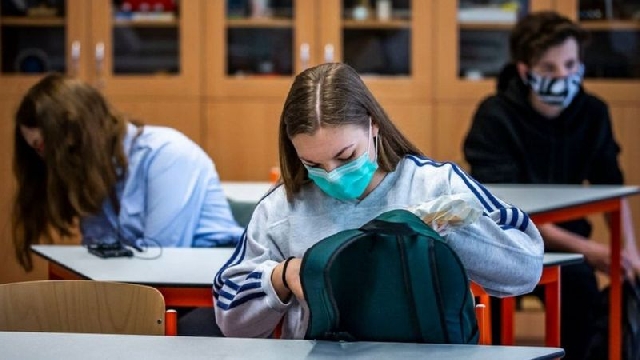Coronavirus: Europe tightens measures amid sharp rise in cases
 Czech school pupils will continue their learning at home
Czech school pupils will continue their learning at home
The Czech Republic is imposing a three-week partial lockdown shutting schools, bars and clubs, as Europe struggles to contain a sharp rise in Covid-19 cases.
The country has the region's highest new infection rate per 100,000 people. Restaurants will be closed and public consumption of alcohol is banned.
In the Netherlands, a partial lockdown was announced, and masks have become compulsory in public indoor spaces.
Meanwhile, hospital admissions are rising fast again in many countries.
Hospitals in Paris could have 90% of their intensive care beds filled by the end next week, Martin Hirsch, the head of public hospital group APHP, warned.
President Emmanuel Macron is expected to announce further restrictions in a televised address on Wednesday. Local media reports suggest that cities considered hotspots, including Paris, could face evening curfews.
Earlier, German Chancellor Angela Merkel said she was "watching with great concern" the situation in Europe, and added: "I must say the situation continues to be serious." German health officials reported more than 5,000 new cases on Wednesday, for the first time since April.
What was announced in the Czech Republic?Schools, bars and clubs will be closed until 3 November while restaurants will be restricted to deliveries and takeaways, until 20:00.
University dorms are also being closed temporarily, and all school lessons will continue at home via the internet. Kindergartens will stay open and special provision will be made for the children of critical care workers.
Masks, already being worn in shops and on public transport, will also have to be worn at tram stops and on train platforms. The maximum for people gathering in a group, whether indoors or outside, will be six.
There have been 1,106 deaths from Covid-19 in the Czech Republic since 1 March, when the country identified its first cases. The highest number of deaths in one day - 55 - was reported on Monday and more than 8,000 new cases were announced on Wednesday, for only the second time since the pandemic began.
In its report for 13 October the EU's European Centre for Disease Prevention and Control (ECDC) shows that confirmed new Covid cases in the Czech Republic in the past 14 days totalled 55,538 - higher than the 42,032 in neighbouring Germany, whose population is eight times bigger.
In March the Czech Republic was quick to impose a strict lockdown, shutting its borders and making mask-wearing compulsory.
But in late June restrictions, including compulsory masks, were abandoned and a huge dinner party was held on Prague's Charles Bridge to celebrate the so-called end of the coronavirus crisis.
What was announced in the Netherlands?The four-week partial lockdown will see bars, restaurants, terraces and cannabis cafes being shut from Wednesday night, and only takeaway services will be allowed. Grocery stores are banned from selling alcohol after 20:00.
"It hurts but it's the only way, we have to be stricter," Prime Minister Mark Rutte said in a news conference.
But there will be no changes to schools' activities. People are being asked to work from home and use public transport for essential journeys only.
Infections in the country have gone up 60% with almost 44,000 new cases in a week. Mr Rutte warned that 75% of regular hospital care would have to be cancelled if the numbers kept increasing.
On Tuesday, the country reported a daily record of nearly 7,400 new infections.
What is happening elsewhere in Europe? An Austrian report into the Ischgl ski resort outbreak that affected more than 6,000 European tourists in March has criticised the local mayor, regional authorities and even Chancellor Sebastian Kurz. Skiing was allowed to continue for three days too long, and when evacuation came it was rushed and disorganised, the report says A new Italian decree bans school trips and amateur contact sports such as football in the park. Private parties are banned and Italians are strongly urged to limit home visits to six people Russia reported record high daily cases - almost 14,000 - and deaths, 244, but the authorities said they did not plan to impose lockdowns across the countrySource: BBC
Trending News

New train crashes on test run
20:35
Alan launches Alliance for Revolutionary Change (ARC) today
06:02
Engineering Council disgusted by Ashanti ECG MD's arrest on minister's orders
11:20
Bawumia visits Madina market Friday
15:23
Ameri name tainted with NDC’s corruption-NPP
17:04
2024 World Earth Day: Reduce production of all forms of plastic to 60% by 2040 – CCLG-Africa to gov’t’s
10:44
Adu-Ampomah & Amoah know Lithovit is liquid fertiliser – COCOBOD RM&E Dir. tells court
10:26
Man allegedly shoots wife in Adaklu
15:01
Ashanti NDC condemns renaming of Ameri Power Plant
16:55
IMF: Failure to agree Eurobond deal 'won't stop us from providing more financing to Ghana'
08:41



